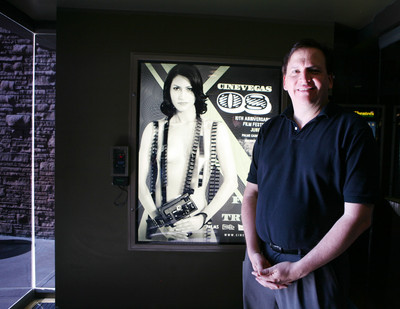CineVegas premiere of ‘Primo’ is UNLV labor of love and loss
If Francisco Menendez seemed out of place at the CineVegas film festival headquarters at the Palms, it's because the 46-year-old head of UNLV's film department probably was.
Surrounded by cocktail-sipping Hollywood types and young go-getters trying to squeeze their way into the notoriously merciless industry, Menendez occupied himself Thursday by assembling his own press packets.
Most feature-length film producers don't have to worry about press packets -- they pay people to do it. But Menendez is used to doing things on his own, with a limited budget.
For the past four years, he and a slew of UNLV film students worked to create the movie "Primo," which Menendez co-wrote and directed, and which premiered at CineVegas Thursday night.
It was a deeply personal project for Menendez.
One of the characters is partly based on him. It was filmed in Las Vegas and his native El Salvador. And his dedication to the production contributed to his divorce.
"I discovered in making 'Medio Tiempo' " -- his first film, a short feature released in 2001 -- "that if I didn't tell stories about Salvadorans, nobody else was going to," he said.
"Primo," Spanish for "cousin," follows the story of three cousins who reunite after fleeing El Salvador during the country's civil war in the early 1980s. They gather in Las Vegas over the failing health of their grandfather, played by veteran actor Henry Darrow, best known for his roles in "High Chaparral" and "Zorro."
Menendez said the character "Eddie," the favorite of the family who goes off to medical school in Chicago, is loosely based on himself.
The project had a limited budget, less than $90,000, almost entirely from grants and awards. But it was filmed with professional actors and professional equipment, some of which was loaned for free to the department.
On Thursday afternoon, as the actors in the movie and former students who worked on the film arrived at the screening, Menendez was almost giddy.
To each new arrival, he handed a button that read: "Primo: I Survived."
Many of the students who contributed to the movie have graduated and moved on. But "Primo" offered most of them their first glimpse of professional filmmaking.
"It was one of the most educational experiences I had at film school," said 27-year-old James Walkit, who did camera work and cinematography for the film. He was working as a freelance cameraman for CineVegas last week.
Being on a professional set, in addition to getting a professional film credit on his resume, was beneficial to 25-year-old Robert Konowalow, who worked as an assistant producer on "Primo."
"Not only was it just real-world experience, it allowed me to have a better language for communicating about film," said Konowalow, who went to the American Film Institute in Los Angeles after graduating from UNLV.
It is rare for film schools at universities to produce feature-length movies, partly because they're cost-prohibitive.
At most film schools around the country, students are taking a 16mm camera "and going and shooting your feet or some birds and putting it together -- and being as un-Hollywood as possible," Menendez said.
Producing a movie with a professional cast and professional equipment provides an invaluable look at the movie industry.
"For film students," he said, "the most important thing for them to realize is: Do they have the disposition to be in this business?"
Menendez began making movies at age 9 in El Salvador. He came to the United States to attend film school.
After El Salvador's civil war in 1984, he returned to the country as a stringer for Time magazine and a translator for CBS News.
But he refused to write scripts about his homeland or his childhood until recently. He wanted to become skilled at telling all kinds of stories on film before he broached the subject of his home country, he said.
That changed with 2001's "Medio Tiempo," about a Salvadoran immigrant living in Las Vegas. It was then that he realized the impact his movies could have on Salvadorans.
"The vast majority of our filmmakers from El Salvador are documentary filmmakers," Menendez said. "(But) storytelling, narrative fiction, is what carries the hopes and dreams of a people. So I discovered in 'Medio Tiempo' that ... all of a sudden they (Salvadorans) were like, 'Oh, someone's telling a story about us.' I wanted to do it again in an epic scale with a micro budget."
He plans to showcase "Primo" at a film festival in El Salvador next month, and the movie will eventually be released on DVD, he said.
Meanwhile, any proceeds from the movie will go back to the UNLV film department for the creation of future movies. He has immediate plans to make a movie about sex slaves in Las Vegas.
As for having a movie premiere at CineVegas, Menendez said he's almost glad the film took so long to make because the 10-year-old festival, for which he used to serve as a board member, has blossomed into a major event.
He almost hadn't realized how important the festival has become until other people from around the country remarked to him about it.
"It's kind of like you don't notice that your spouse is fat, because you see them every day," he said.
"It's the same thing with CineVegas, because I've seen it every year."
Contact reporter Lawrence Mower at lmower@reviewjournal.com or 702-383-0440.



















